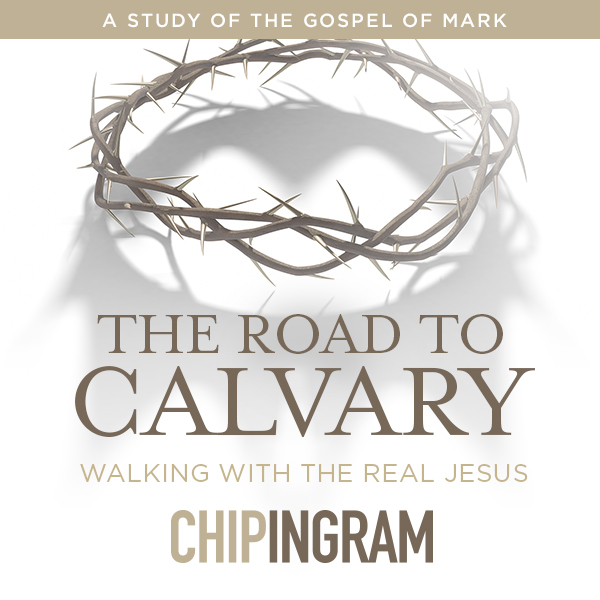In this article, Chip Ingram reminds us how God feels about us when we’re at rock bottom, and points out the beautiful truths in each of God’s redemption stories, including ours.

Current Series
Journey With The Real Jesus
Walk the first-century streets side by side with Jesus, gaining a deeper understanding of His mission, sacrifice, and love.
Free MP3Listen NowWhere is God when we hit rock bottom? What does He think of us when He finds us there?
There are five significant parts of every redemption story, whether it’s your story or mine. Use the links below if you want to quickly jump to the five points.
- Something valuable is lost.
- There’s an intensive search that occurs.
- That which was lost is found.
- A great celebration follows.
- God and the angels rejoice in heaven.
Often, we imagine Him looking down at us, shaking His head. Can you relate? Sometimes you might believe that He’s turned His back on you, politely — but disappointingly — waiting for you to clean yourself up.
Because we do know better, don’t we?
Where is He when the things you put hope into, like a relationship, job, or dream, go up in flames, and you’re trying desperately to get that thing back? This isn’t just a picture of someone at the bottom, in their lowest moment, but it’s also a picture of someone who appears to not have any hope or direction whatsoever.
When the Pharisees wondered why Jesus associated with people at the very bottom — of the social scale or the pit they’d created in their lives — He answered by telling three stories. In each of the parables from Luke 15:3-32, we can identify 5 details that tell us a lot about God’s perspective of redemption and what He thinks about us when we’re at the bottom.
Know God: Who Is The Real God? 3 Surprising Attributes of His Character
THREE PARABLES
THE PARABLE OF THE LOST SHEEP
Now the tax collectors and sinners were all gathering around to hear Jesus. But the Pharisees and the teachers of the law muttered, “This man welcomes sinners and eats with them.”
Then Jesus told them this parable: “Suppose one of you has a hundred sheep and loses one of them. Doesn’t he leave the ninety-nine in the open country and go after the lost sheep until he finds it? And when he finds it, he joyfully puts it on his shoulders and goes home. Then he calls his friends and neighbors together and says, ‘Rejoice with me; I have found my lost sheep.’ I tell you that in the same way there will be more rejoicing in heaven over one sinner who repents than over ninety-nine righteous persons who do not need to repent.
THE PARABLE OF THE LOST COIN
“Or suppose a woman has ten silver coins and loses one. Doesn’t she light a lamp, sweep the house and search carefully until she finds it? And when she finds it, she calls her friends and neighbors together and says, ‘Rejoice with me; I have found my lost coin.’ In the same way, I tell you, there is rejoicing in the presence of the angels of God over one sinner who repents.”
THE PARABLE OF THE LOST SON
Jesus continued: “There was a man who had two sons. The younger one said to his father, ‘Father, give me my share of the estate.’ So he divided his property between them.
“Not long after that, the younger son got together all he had, set off for a distant country and there squandered his wealth in wild living. After he had spent everything, there was a severe famine in that whole country, and he began to be in need. So he went and hired himself out to a citizen of that country, who sent him to his fields to feed pigs. He longed to fill his stomach with the pods that the pigs were eating, but no one gave him anything.
“When he came to his senses, he said, ‘How many of my father’s hired servants have food to spare, and here I am starving to death! I will set out and go back to my father and say to him: Father, I have sinned against heaven and against you. I am no longer worthy to be called your son; make me like one of your hired servants.’ So he got up and went to his father.
“But while he was still a long way off, his father saw him and was filled with compassion for him; he ran to his son, threw his arms around him and kissed him.
“The son said to him, ‘Father, I have sinned against heaven and against you. I am no longer worthy to be called your son.’
THE CELEBRATION
“But the father said to his servants, ‘Quick! Bring the best robe and put it on him. Put a ring on his finger and sandals on his feet. Bring the fattened calf and kill it. Let’s have a feast and celebrate. For this son of mine was dead and is alive again; he was lost and is found.’ So they began to celebrate.
“Meanwhile, the older son was in the field. When he came near the house, he heard music and dancing. So he called one of the servants and asked him what was going on. ‘Your brother has come,’ he replied, ‘and your father has killed the fattened calf because he has him back safe and sound.’
“The older brother became angry and refused to go in. So his father went out and pleaded with him. But he answered his father, ‘Look! All these years I’ve been slaving for you and never disobeyed your orders. Yet you never gave me even a young goat so I could celebrate with my friends. But when this son of yours who has squandered your property with prostitutes comes home, you kill the fattened calf for him!’
“‘My son,’ the father said, ‘you are always with me, and everything I have is yours. But we had to celebrate and be glad, because this brother of yours was dead and is alive again; he was lost and is found.’”
5 Things You’ll Find In Stories of God’s Redemption
Whether it’s a sheep, a coin, or a child, Jesus uses these stories to illustrate beautiful truths found in every story of redemption. These truths are in my story, and they can be a part of yours, too.
1. Something valuable is lost.
In each parable, the lost item had immense value to the main character. The caretaker or owner knew the misplaced thing was valuable and that it was nowhere to be found. Also, that did not discount the worth of many valuable items surrounding them.
With each of these stories of God’s redemption, Jesus’ point to the Pharisees was that God deeply values things that are lost. In other words, He sees lost people — irreligious, immoral, sinful people — as valuable and worthy of finding. And if we know God, we should, too.
Know that you are valuable, known and loved JUST as you are.
God deeply values things that are lost. In other words, He sees lost people — irreligious, immoral, sinful people — as valuable and worthy of finding. That’s me, and that’s you. Share on X2. There’s an intensive search that occurs.
The characters in these stories don’t shrug their shoulders and ignore the lost things; every stone is turned in an effort to find what is lost.
As a picture of God, He is not waiting for the lost thing to present itself. Rather, He is actively drawing them to Himself. There’s an intensive search:
The shepherd desperately looks for the sheep.
The woman ransacks her house.
The father was willing to embarrass himself to show the son love.
Jesus is making this point — God is waiting, searching, looking, and longing for irreligious people that don’t want to have anything to do with Him. He’s pursuing them.
The Father isn’t relaxing and waiting for irreligious people to get it together and come to Him. He’s chasing after them, turning over every stone to find them.
Right now, He’s actively drawing YOU to Himself.
He pursues us even when we’re at the bottom, in despair. He’s not waiting for you, He’s lovingly chasing after you!
Pray God’s Promises: How To Pray With Absolute Confidence
3. That which was lost is found.
Being found is synonymous with repentance. The root word in the New Testament for “repent” is the idea of a change of mind, like being deeply sorry or sad about your behavior.
Let’s take another look at the third parable, in which the father represents God. The two sons depict immoral sinners: the younger son is like the immoral people Jesus has been hanging out with, and the older son is like the Pharisees who are questioning Him.
Can you see the main difference between the sons? It’s not their behavior, because both are slaves — one to his impulses, and one to his duty. But only one boy seems to recognize his hopelessness.
What’s the main difference between the brothers in the Parable of the Lost Son? It’s not their behavior, because both are slaves — one to his impulses, and one to his duty. But only one boy seems to recognize his hopelessness. Share on XLike us, he goes from hopelessness to low spirits, a sense of futility, despair, dejection, and ultimately, desperation. In these moments of desperation, we have a window of time when we can come to our senses and recognize our misplaced hope. And then we realize: That doesn’t have the power to fill me up. It can’t be my hope.
He then realizes that he’s blown it and he would do anything to be back with his family, even as a hired hand. He comes to his senses and says, “I’m going to TURN around and go back to my father.”
His hope was now in the father; he repented.
The son confessed, acknowledging that he sinned against his father, owning his folly. This is repentance.
Is repentance part of your story of God’s redemption? Have you owned your folly and your misplaced hope and turned to the Father?
Parenting encouragement: 4 Inspired Portraits Revealing the Roles of a Faithful Father
4. A great celebration follows.
Our human instinct is to try and repay the Father for what He’s done.
Like the son in Luke 15 who wanted to make things right with his father, we try and even the scales with our good works and our sincere effort.
But God says to us — as the father said to the son — “It’s not about what you can do; it’s about WHO I AM and how I feel about you and how much I love you. I want to receive you to myself.”
And to demonstrate that point, he throws a party to celebrate our repentance. In the story, the father threw an incredible party, both to celebrate and to publicly honor this repentant son. This is love and forgiveness.
There is hope. Jesus is hope. And it’s never too late — no matter your age or history — to repent and be restored.
The party thrown by the father in the Parable of the Lost Son is significant. It celebrated the son’s repentance, but it also publicly restored and honored him. This is God’s love and forgiveness. Share on X
5. God and the angels rejoice in heaven.
The party isn’t just on earth; when one sinner repents, all of Heaven rejoices!
…there is rejoicing in the presence of the angels of God over one sinner who repents. (Luke 15:10b)
Maybe a literal party wasn’t thrown for you upon your repentance but be encouraged knowing that angels have celebrated you and your restoration to the Father.
Transformation awaits: 4 Beliefs That Will Catapult Your Growth As A Christian
YOUR REDEMPTION STORY

Our failures are never final. There is a Father who longs to forgive you, cleanse you, restore you, empower you, and offer you a second opportunity, a clean slate, and set you on a new path.
If you have never repented and asked Him to forgive you and be your Father, that’s His will for you. It’s not about just intellectually agreeing about what Christ did through His death and resurrection, but a turning and a repentance and laying hold of the gift that God gives you.
It’s not too late. Look around and notice the ways the Father is pursuing you. Your redemption story is being written.
God wants to forgive, cleanse, restore, offer a clean slate, and set you on a new path. If you have never repented and asked Him to forgive you and be your Father, that’s His will for you. It’s more than Christian living or faith knowledge, it’s about putting your hope in Him. What’s your redemption story? We’d love to hear it!
Learn more about living a life of hope when things don’t make sense, and how to navigate everyday living under God’s grace when you tune into Chip Ingram’s series on YouTube, Jesus Offers Hope.
RELATED ARTICLES
4 Events That Explain God’s Grace For Prodigal Sons
Experience True Spirituality When You Transform 5 Key Relationships
RELATED RESOURCES
Sermon Series on YouTube, Jesus Offers Hope

Written By
Chip Ingram
Founder & Teaching Pastor, Living on the Edge
Chip Ingram is the CEO and teaching pastor of Living on the Edge, an international teaching and discipleship ministry. A pastor for over thirty years, Chip has a unique ability to communicate truth and challenge people to live out their faith. He is the author of many books, including The Real God, Culture Shock and The Real Heaven. Chip and his wife, Theresa, have four grown children and twelve grandchildren and live in California.
More Articles by Chip


